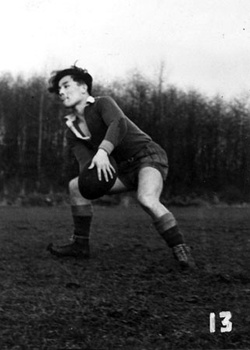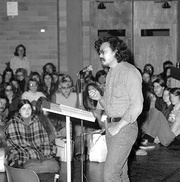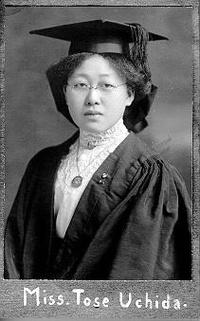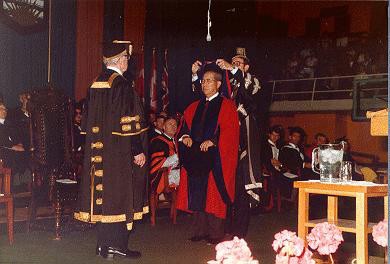When President Franklin D. Roosevelt of the United States signed Executive Order 9066 in 1942, he sent 110,000 innocent Japanese Americans and Japanese nationals to internment camps.
Similarly, when Canadian Prime Minister William Lyon MacKenzie King invoked the War Measures Act, 22,000 innocent Japanese Canadians and Japanese national were moved a hundred miles east from the British Columbia coast to internment camps, prisoner of war camps, sugar beet fields on the prairies and to the road camps.

Tom Nishio at University of British Columbia, 1940. He and his family were connected with the Mikasa chinaware empire and he is still living in Toronto. (Photo courtesy of University of British Columbia Archives)
The seventy-six Japanese Canadian students enrolled at University of British Columbia (UBC) for the winter session of 1941-42 were not exempt from this order. Except for professor Morrow of the Department of Commerce, no faculty member spoke up to defend their students.
When the decision was made on January 7, 1942 to expel six Japanese Canadian students in the Canadian Officer Training Corp and forty-three in the Basic group, the Committee on Military Education was composed of the Chancellor, R.E. McKechnie, President of UBC, L.S. Klinck, Dean, J.N Finlayson, Mr. B. Wood, Mr. Edward McBride, and Lt.-Col. Gordon M. Shrum.
They succumbed under the pressures of the popular feelings of British Columbians, on campus and outside. The expelled students were shocked that the symbol of truth and enlightenment had bowed to the pressures of hostilities boiling in the communities outside of UBC. They were powerless to defend their citizenship, honour and rights.
In the United States, sympathetic University of California (UC) faculty and administrators protested loudly against the inclusion of their students in Executive Order 6099. They helped some students finish their course work from the camps and others to enroll in universities outside the exclusion zone.

Dr. David Suzuki, a former UBC professor, 1971. (Photo courtesy of University of British Columbia Archives)
Like in Canada, there were some students who were not able to continue their education due to circumstances such as lack of money and family situations. Those who did enroll in other universities achieved great successes not only in their academic achievements but in their careers.
In the United States, a coalition called “The California Nisei Diploma Project” was formed to convince the universities to award special honorary degrees to all of the Japanese American students who were forced to leave campuses at Berkeley, Los Angeles, San Francisco and Davis in 1942. Their task also included locating the former students or family members of the students who had passed away.
In California, Assembly Bill 37 was introduced in December of 2008 and was signed into law by former Governor Arnold Schwarzenegger in October of 2009. This legislative bill made it possible for California Universities, Community Colleges and California State Universities to confer honorary degrees to Japanese American students who were forced to leave their educational institutions as the result of Executive Order 9066.
Even before this Bill was signed, the University Of California Board Of Regents voted to grant honorary degrees to students of Japanese ancestry who were unable to complete their education at the university that they were registered in due to the internment during WWII. This was the first time in thirty-seven years that this was done.
In June of 2009, the Academic Assembly voted unanimously to amend Senate regulations and asked the UC Regents to override their long standing moratorium on honorary degrees and recognize the historic injustice.
At the graduating ceremony at UC Davis, Senate Vice Chair Daniel Simmons praised the Regents’ vote by saying, “The Senate deserves to be proud of its role in structuring this unique honorary degree for former students whose lives were disrupted by a nationally recognized denial of their civil rights.”
On the diploma was this inscription in both Latin and in English which read, “To Restore Justice among the Groves of the Academe”. On the four campuses in 1942, there were seven hundred Japanese American students.
On April 6, 2008, the University of Oregon and Oregon State University granted honorary degrees to former Japanese American students who were enrolled there in 1941-42 winter session.
On May 18, 2008, the University of Washington also handed out honorary degrees. All of the honorary degrees presented at these ceremonies were given to surviving former students who were in their 80s and 90s, or posthumously to family members.
At most of the universities along the Pacific coast in 1942, Japanese American students made up the largest minority group. These students suffered grievous loses but picked up the broken pieces of their lives and rebuilt. At all of the ceremonies, there was excitement, laughter and tears of joy as each student resplendent in their cap and gown, marched up to received their diplomas.
President Stephen V. Sundborg of the University of Seattle stated at the ceremony, “Let us remember what the Japanese American of the 1940s went through, the cost of ignorance and prejudice and the importance of moral leadership in confronting social wrongs during times of crisis and conflict.”

Miss. Tose Uchida, McGill University College of B.C., 1914 (Photo courtesy of University of British Columbia Archives)
The UBC Senate Tributes Committee has refused our request to have the University present honorary degrees to her former Japanese Canadian students registered in the winter session of 1941-42.
Although we have been informed that a Task Force has been created in consultation with the President of UBC, Dr. Stephen Toope to look into our request, we have heard nothing from them since October 6, 2010.
The letter dated February 18, 2010, from the Chair, Dr. Sally Thorne states in part:
“In contrast to the situation in the USA, no students were expelled from UBC. Rather, students (and faculty and staff) of Japanese heritage left the university for many reasons, including forced relocation. So UBC’s role within this issue is not directly comparable to that of universities south of the border. Nevertheless, UBC wishes to identify an appropriate tribute to the lessons that must not be forgotten. And within this context, it is highly unlikely that granting honorary degrees to a small subset of the many people affected by the political and social decisions of that time in history will be the chosen mechanism.”
This sentiment informs us that those members dealing with our request have minimal knowledge of the history of the Japanese Canadians.

Dr. Tom Shoyama, a former federal cabinet minister in the Pierre Trudeau government, received honorary degree in 1984. (Photo courtesy of University of British Columbia Archives)
We are asking those former UBC students or relatives of those who have passed away to contact us by email at heiwa@telus.net or by phone at 604-943-3195. We will need your names and contact numbers so that we can phone you to get your history. You deserve to be honoured however late. We will continue our effort on your behalf to see that you receive your special honorary degree, resplendent in your cap and gown.
© 2011 Mary Kitagawa


